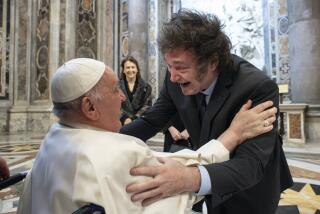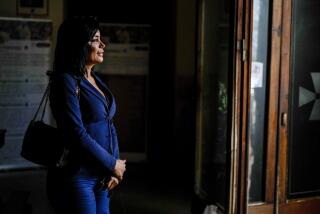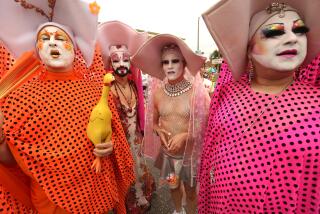Pilgrims Gather for Canonization of Opus Dei Founder
- Share via
ROME — Tens of thousands of pilgrims from around the world have descended on Rome to grab a ringside seat for the canonization of Father Josemaria Escriva, founder of the conservative religious group Opus Dei.
Spanish priest Escriva founded the group, whose name means “God’s Work,” in 1928 around the idea that people could be paragons of holiness and live completely ordinary lives, whether as a banker or a baker.
“This canonization is the canonization of daily life,” Msgr. Flavio Capucci told a news conference. Capucci was Escriva’s “postulator,” arguing his qualifications for sainthood before the Vatican Congregation for the Causes of Saints in a process that lasted for a quarter of a century.
Pope John Paul II is scheduled to formally make Escriva a saint Sunday in a ceremony in St. Peter’s Square. The celebration is drawing worshipers from Brazil, Australia, Cameroon, Poland and especially Spain, which was Escriva’s home country. Organizers expect more than 250,000 people to attend the canonization. Officials expect 1,000 from Australia and 4,000 from Chile to attend.
The celebrations, which will last five days, could rival those for the canonization of Padre Pio, the Italian friar, who drew a record 300,000 people to the square June 16.
As Opus Dei claims only 84,000 members worldwide, most of the pilgrims will be friends and supporters of the movement.
Those planning to attend the Mass include Lech Walesa, the Solidarity labor leader who became Poland’s first post-communist president; the vice president of Guatemala; the first ladies of Ecuador and Costa Rica; and Italian government and opposition leaders
On Thursday, Escriva’s body was moved from the church of Santa Maria della Pace, its resting place since his death in 1975, to a bigger church, Sant’ Eugenio, to accommodate the pilgrims passing by the coffin to pay their respects.
At the front of the queue was American Jeff Sattler, who had traveled from Houston, for Escriva’s canonization.
“He’s the saint for our day; he’s the saint for the workers. That’s us all--you and me,” he said, as a woman in a wheelchair prayed in front of the coffin.
Opus Dei exercises political and financial influence beyond the church. For many years, its influence was criticized and led to accusations that the group was a secretive sect.
Members of the order were prominent in Francisco Franco’s long dictatorship in Spain. The order remains controversial in that country.
Asked about the ties to Franco, Capucci said this week that “Escriva could not prevent their belonging to that executive because there was no church pronouncement on it, and the hierarchy did not bar Catholics from this type of choice. The democratic conscience is a given today, but we cannot look at the past with the eyes of the present.”
Supporters of Opus Dei contend that the movement was a precursor to the Vatican II reforms of the mid-1960s because it has emphasized the role of the laity in the church and upheld the equality of women.
The current pope has shown great favor toward the group, in part because of Escriva’s strong anti-communism. John Paul’s spokesman, Joaquin Navarro-Valls, is perhaps the world’s most recognized member.
Some say that the speed of Escriva’s path to sainthood is an indication of the changing attitudes toward the organization.
In 1992, only 17 years after his death--a record at the time--he was named a “blessed” of the church.
Born in Barbastro in northeastern Spain near the Pyrenees in 1902, Escriva was a priest and a lawyer. He spent the Spanish Civil War and World War II in Spain, then moved to Rome in 1946 to direct Opus Dei’s international expansion. He died there in 1975.
Escriva’s beatification May 17, 1992, caused controversy, in part because it came only 17 years after his death, but Capucci attributed the speed to reforms in the process that John Paul introduced in 1983 and noted that other candidates have achieved sainthood in less time than Escriva.
More to Read
Sign up for Essential California
The most important California stories and recommendations in your inbox every morning.
You may occasionally receive promotional content from the Los Angeles Times.










